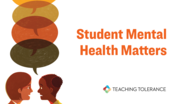The End-of-Year Mental Health Check



Throughout May, we've been sharing resources supporting educator and student mental health. Now, as Mental Health Awareness Month comes to a close, we hope you'll commit to integrating mental health literacy into your curricula and normalizing discussions of mental health and wellness year round.
It’s essential that educators, students and the entire school community work to reduce stigma associated with mental health issues, especially during Black, Indigenous and People of Color (BIPOC) Mental Health Month. Help interrupt school practices that disregard mental health—particularly for Black youth, who are less likely to receive adequate mental health care. Use these webinars to understand and practice self-care and address challenges students face.
As we grapple with the impact of violence following shootings in Atlanta and Boulder—and ongoing stressors surrounding the pandemic—it’s important to be mindful of students’ mental health needs and our own. Share resources like the Crisis Text Line with students, some of whom may need immediate support amidst a crisis. And use these webinars to help you respond to trauma, normalize talking about mental health and continue practicing good self-care.

In recognition of Mental Health Awareness Month, we're sharing resources for destigmatizing conversations about this critical topic. We hope you'll read, share and use them to make your classroom, school and district safe and inclusive for all students.
As we confront the ongoing assaults on education and individual rights—including anti-CRT and anti-LGBTQ laws, book bans, and the threat to reproductive rights—we recognize that these issues have compounded the stress at the end of the academic year. These resources provide strategies for educators, caregivers and community members to support the mental health and well-being of our nation’s youth.
Current events may be hard to grapple with as multiple historically Black colleges and universities faced bomb threats, Minneapolis police fatally shot Amir Locke, and many states and districts continue to ban teaching inclusive books and talking about race. Amidst these aggressions, we want to remind Black educators to practice self-care—and all educators to elevate the importance of Black students’ experiences and their mental health. These resources can help.
This Mental Health Awareness Month, we hope you find time and space to take care of yourself and support your students. These resources, including an article introducing the Crisis Text Line, recommend practices that can be used at the district, school or classroom level.